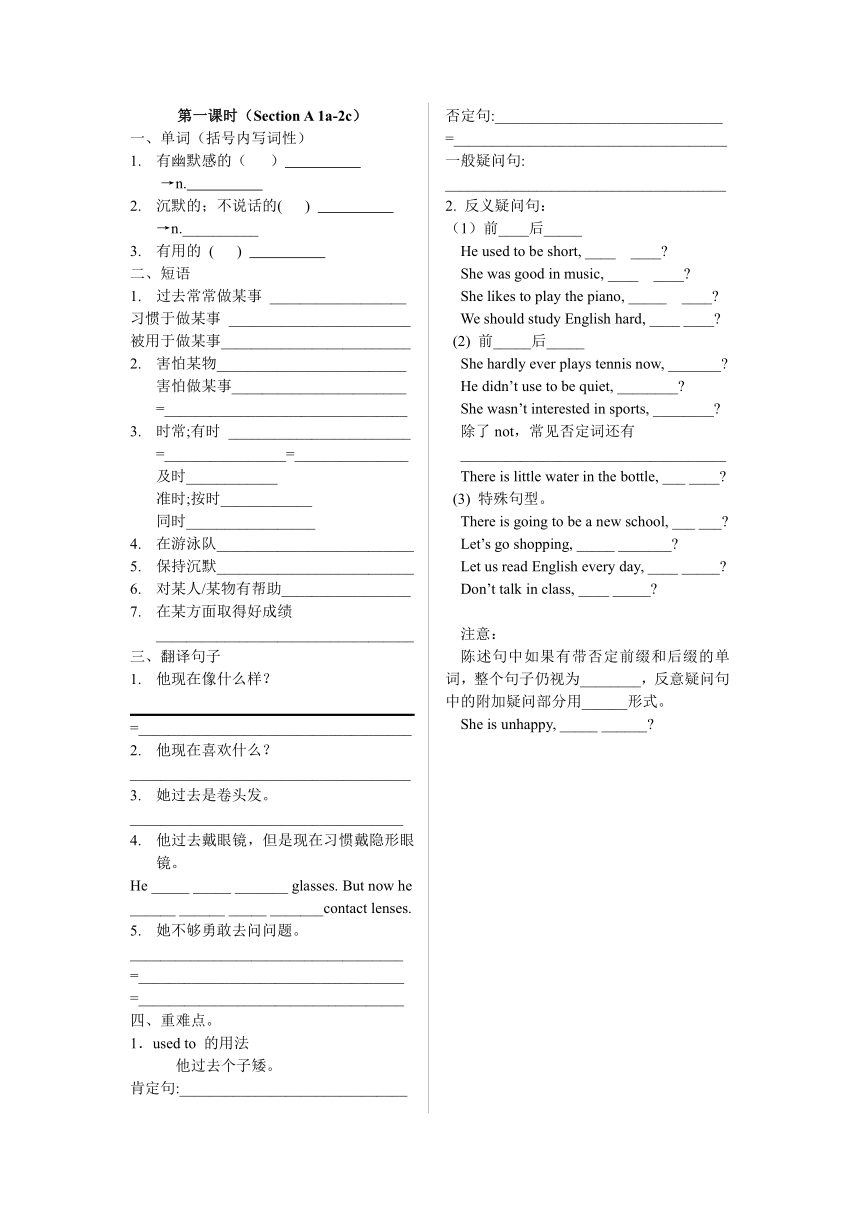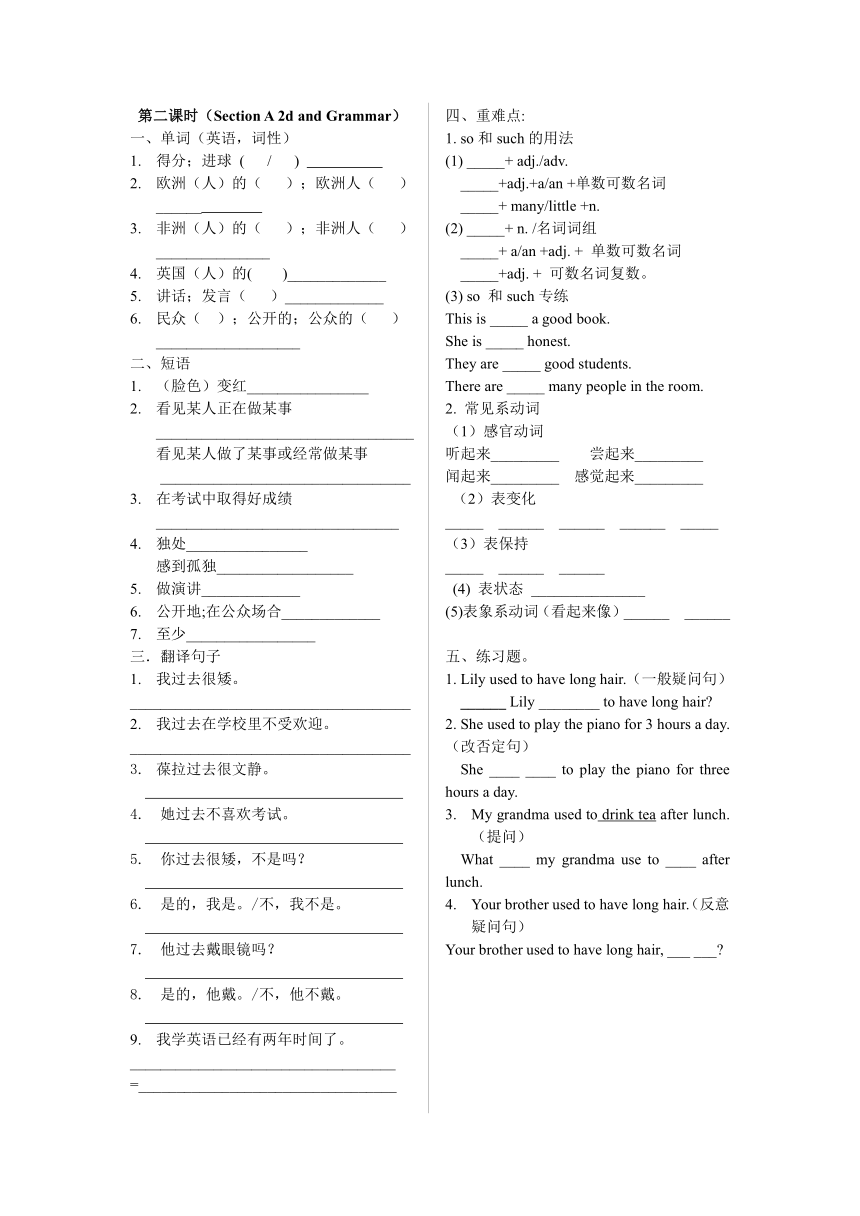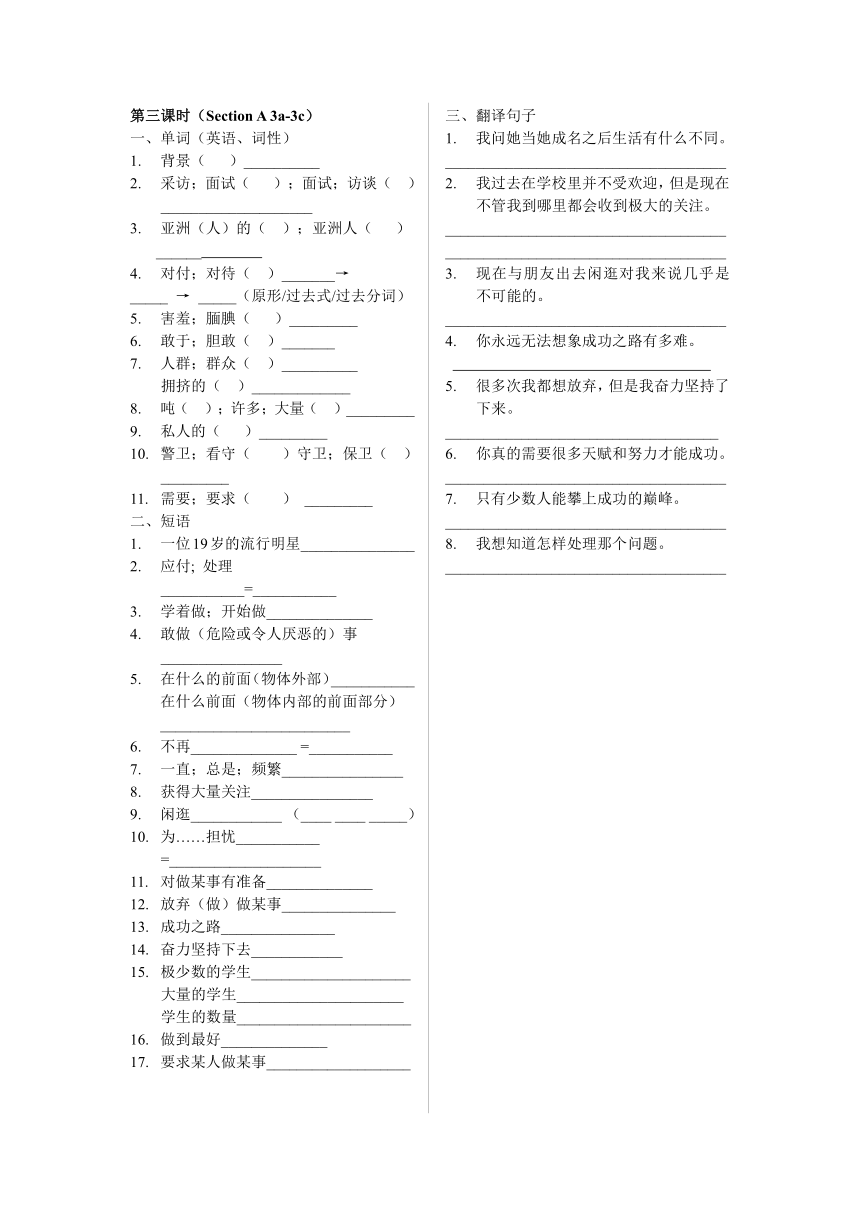Unit4 I used to be afraid of the dark全单元课时导学案(6课时,无答案)人教版英语九年级全册
文档属性
| 名称 | Unit4 I used to be afraid of the dark全单元课时导学案(6课时,无答案)人教版英语九年级全册 |  | |
| 格式 | docx | ||
| 文件大小 | 31.7KB | ||
| 资源类型 | 教案 | ||
| 版本资源 | 人教新目标(Go for it)版 | ||
| 科目 | 英语 | ||
| 更新时间 | 2024-07-24 13:19:25 | ||
图片预览



文档简介
第一课时(Section A 1a-2c)
一、单词(括号内写词性)
有幽默感的( )
→n.
沉默的;不说话的( )
→n.__________
有用的 ( )
二、短语
过去常常做某事 __________________
习惯于做某事 ________________________
被用于做某事_________________________
害怕某物_________________________
害怕做某事_______________________
=________________________________
时常;有时 ________________________
=________________=_______________
及时____________
准时;按时____________
同时_________________
在游泳队__________________________
保持沉默__________________________
对某人/某物有帮助_________________
在某方面取得好成绩
__________________________________
三、翻译句子
他现在像什么样?
=____________________________________
他现在喜欢什么?
_____________________________________
她过去是卷头发。
____________________________________
他过去戴眼镜,但是现在习惯戴隐形眼镜。
He _____ _____ _______ glasses. But now he
______ ______ _____ _______contact lenses.
她不够勇敢去问问题。
____________________________________
=___________________________________
=___________________________________
四、重难点。
1.used to 的用法
他过去个子矮。
肯定句:______________________________
否定句:______________________________
=____________________________________
一般疑问句:
_____________________________________
2. 反义疑问句:
(1)前____后_____
He used to be short, ____ ____
She was good in music, ____ ____
She likes to play the piano, _____ ____
We should study English hard, ____ ____
(2) 前_____后_____
She hardly ever plays tennis now, _______
He didn’t use to be quiet, ________
She wasn’t interested in sports, ________
除了not,常见否定词还有
___________________________________
There is little water in the bottle, ___ ____
(3) 特殊句型。
There is going to be a new school, ___ ___
Let’s go shopping, _____ _______
Let us read English every day, ____ _____
Don’t talk in class, ____ _____
注意:
陈述句中如果有带否定前缀和后缀的单词,整个句子仍视为________,反意疑问句中的附加疑问部分用______形式。
She is unhappy, _____ ______
第二课时(Section A 2d and Grammar)
一、单词(英语,词性)
得分;进球 ( / )
欧洲(人)的( );欧洲人( )
______
非洲(人)的( );非洲人( )
_______________
英国(人)的( )_____________
讲话;发言( )_____________
民众( );公开的;公众的( )
___________________
二、短语
(脸色)变红________________
看见某人正在做某事
__________________________________
看见某人做了某事或经常做某事
_________________________________
在考试中取得好成绩
________________________________
独处________________
感到孤独__________________
做演讲_____________
公开地;在公众场合_____________
至少_________________
三.翻译句子
我过去很矮。
_____________________________________
我过去在学校里不受欢迎。
_____________________________________
葆拉过去很文静。
她过去不喜欢考试。
你过去很矮,不是吗?
是的,我是。/不,我不是。
他过去戴眼镜吗?
是的,他戴。/不,他不戴。
我学英语已经有两年时间了。
___________________________________
=__________________________________
四、重难点:
1. so和such的用法
(1) _____+ adj./adv.
_____+adj.+a/an +单数可数名词
_____+ many/little +n.
(2) _____+ n. /名词词组
_____+ a/an +adj. + 单数可数名词
_____+adj. + 可数名词复数。
(3) so 和such专练
This is _____ a good book.
She is _____ honest.
They are _____ good students.
There are _____ many people in the room.
2. 常见系动词
(1)感官动词
听起来_________ 尝起来_________
闻起来_________ 感觉起来_________
(2)表变化
_____ ______ ______ ______ _____
(3)表保持
_____ ______ ______
(4) 表状态 _______________
(5)表象系动词(看起来像)______ ______
五、练习题。
1. Lily used to have long hair.(一般疑问句)
______ Lily ________ to have long hair
2. She used to play the piano for 3 hours a day.(改否定句)
She ____ ____ to play the piano for three hours a day.
My grandma used to drink tea after lunch.(提问)
What ____ my grandma use to ____ after lunch.
Your brother used to have long hair.(反意疑问句)
Your brother used to have long hair, ___ ___
第三课时(Section A 3a-3c)
一、单词(英语、词性)
背景( )__________
采访;面试( );面试;访谈( )
____________________
亚洲(人)的( );亚洲人( )
______
对付;对待( )_______→
_____ → _____(原形/过去式/过去分词)
害羞;腼腆( )_________
敢于;胆敢( )_______
人群;群众( )__________
拥挤的( )_____________
吨( );许多;大量( )_________
私人的( )_________
警卫;看守( )守卫;保卫( )_________
需要;要求( ) _________
二、短语
一位19岁的流行明星_______________
应付; 处理 ___________=___________
学着做;开始做______________
敢做(危险或令人厌恶的)事________________
在什么的前面(物体外部)___________
在什么前面(物体内部的前面部分)_________________________
不再______________ =___________
一直;总是;频繁________________
获得大量关注________________
闲逛____________ (____ ____ _____)
为……担忧___________
=____________________
对做某事有准备______________
放弃(做)做某事_______________
成功之路_______________
奋力坚持下去____________
极少数的学生_____________________
大量的学生______________________
学生的数量_______________________
做到最好______________
要求某人做某事___________________
三、翻译句子
我问她当她成名之后生活有什么不同。
_____________________________________
我过去在学校里并不受欢迎,但是现在不管我到哪里都会收到极大的关注。
_____________________________________
_____________________________________
现在与朋友出去闲逛对我来说几乎是不可能的。
_____________________________________
你永远无法想象成功之路有多难。
很多次我都想放弃,但是我奋力坚持了下来。
____________________________________
你真的需要很多天赋和努力才能成功。
_____________________________________
只有少数人能攀上成功的巅峰。
_____________________________________
我想知道怎样处理那个问题。
_____________________________________
第四课时(Section B 1a-1e)
单词
欧洲的,( )________
非洲的,( )________
英国的( )__________
讲话、发言 ________
公众,公开的( )________
蚂蚁( )________
昆虫( )________
焦虑,紧张( )______
二、短语
为…感到紧张 ___________
在过去______________
一直______________
担心______________=______________
穿校服______________
三、句子
我们可以穿我们喜欢的衣服去学校?
_____________________________________
我过去一直担心我的考试。
_____________________________________
四、练习题。
1.她对她的发言感到紧张
She was ________ ________ her speech.
2.请不要再公共场所大声说话。
Please don’t speak loudly _____ _____.
3.这个小孩为什么一直哭?
Why is the little boy crying _____ _____ _____
4.Tina used to have long hair.(改为一般疑问句)
_______ Tina _______ to have long hair
5.There used to be a hospital behind our school.(改为否定句)
There _________ ________to be a hospital behind our school.
五、 短文填空。
For this month’s Yong World magazine, I (1)________ 19-year-old Asian pop star Candy Wang. Candy told me that she used to be really shy ad took up (2)_______ to deal with her (3)_______. As she got better, she (4)______ to sing in front of her class, and then for the whole school. Now she’s not shy anymore and loves singing in front of crowds.
I asked Candy how life was different after she became famous. She (5)_______ that there are many good things, like being able to travel and meet new people all the time. “I didn’t use to be (6)_______ in school, but now I get tons of attention everywhere I go.” However, too much attention can also be a bad thing. “I always have to worry about how I appear to others, and I have to be very careful about what I say or do. And I don’t have much (7)_____ time anymore. Hanging out with friends is almost (8)______ for me now because there are always guards around me.”
What does Candy have to say to all those young people who want to become famous “Well,” she begins slowly, “you have to be (9)_____ to give up your normal life. You can never (10) _______ how difficult the road to success is. Many times I thought about giving up, but I fought on. You really (11)_______ a lot of talent and hard work to succeed. Only a very small number of people (12)______ it to the top.
第五课时(Section B 2b)
一、单词(英语、词性)
不常,很少( )________
v&n影响___________
缺席,不在_______
n.__________
不及格,失败( )__________
考试,审查( )__________
寄宿学校( )___________
精确地,确切地( )___________
自豪,骄傲( )_______________
自豪的,骄傲的( )___________
总的,普遍的( )___________
二、短语
一个18岁的女孩_______________
做得好,擅长于___________
=__________________
在做……有困难_______________
=____________________________
=____________________________
给某人带来难题________________
寻找________________
照顾_________________
=___________________
=___________________
小心_______________= ___________
感到孤独和不开心________________
对某人有影响_______________
缺席 _______________
考试不及格_______________
未能做某事_______________
决定做某事(2)_______________
=____________________________
三、句子
李文是一个来自农村的15岁的普通男孩。
_____________________________________
很难相信他曾经在学习方面有困难。
_____________________________________
他太思念他的父母,他总是感到孤独和难过。
_____________________________________
李文的不快乐开始影响他的学业。
_____________________________________
他变得对学习不那么感兴趣了。
_____________________________________
最后,李文的父母决定送他去寄宿学校。
_____________________________________
第六课时(Section B 2b)
一、单词(英语、词性)
不常,很少( )________
v&n影响___________
缺席,不在_______
不及格,失败( )__________
n.______________
考试,审查( )__________
寄宿学校( )___________
精确地,确切地( )___________
自豪,骄傲( )_______________
自豪的,骄傲的( )___________
总的,普遍的( )___________
介绍( )___________
总的,大概的( )___________
二、短语
能做某事___________
建议某人(不)做某事_______________
建议做某事_______________
=___________________
亲自______________
即使_______________
总是做某事_______________
为……感到骄傲_______________
=___________________________
…的骄傲_________________
为做某事感到骄傲
_______________________
与某人沟通_______________
=____________________
总的来说______________
在过去的几年里___________________
(用______________时态)
在过去________________________
(用______________时态)
对……有很大影响________________________
给某人讲笑话___________________
三、句子
他有时上课缺席和考试不及格
_____________________________________
_____________________________________
她建议父母们亲自和儿子谈一谈
_____________________________________
_____________________________________
他们为我做的一切好的事情感到骄傲!
_____________________________________
对父母而言,在那里支持孩子是非常重要的
_____________________________________
_____________________________________
现在我明白了,尽管他们很忙,但他们总是在挂念我。
_____________________________________
我现在更开心了,甚至比以前更努力地学习。
____________________________________
对父母来说,陪伴在孩子身边是很重要的。
_____________________________________
一、单词(括号内写词性)
有幽默感的( )
→n.
沉默的;不说话的( )
→n.__________
有用的 ( )
二、短语
过去常常做某事 __________________
习惯于做某事 ________________________
被用于做某事_________________________
害怕某物_________________________
害怕做某事_______________________
=________________________________
时常;有时 ________________________
=________________=_______________
及时____________
准时;按时____________
同时_________________
在游泳队__________________________
保持沉默__________________________
对某人/某物有帮助_________________
在某方面取得好成绩
__________________________________
三、翻译句子
他现在像什么样?
=____________________________________
他现在喜欢什么?
_____________________________________
她过去是卷头发。
____________________________________
他过去戴眼镜,但是现在习惯戴隐形眼镜。
He _____ _____ _______ glasses. But now he
______ ______ _____ _______contact lenses.
她不够勇敢去问问题。
____________________________________
=___________________________________
=___________________________________
四、重难点。
1.used to 的用法
他过去个子矮。
肯定句:______________________________
否定句:______________________________
=____________________________________
一般疑问句:
_____________________________________
2. 反义疑问句:
(1)前____后_____
He used to be short, ____ ____
She was good in music, ____ ____
She likes to play the piano, _____ ____
We should study English hard, ____ ____
(2) 前_____后_____
She hardly ever plays tennis now, _______
He didn’t use to be quiet, ________
She wasn’t interested in sports, ________
除了not,常见否定词还有
___________________________________
There is little water in the bottle, ___ ____
(3) 特殊句型。
There is going to be a new school, ___ ___
Let’s go shopping, _____ _______
Let us read English every day, ____ _____
Don’t talk in class, ____ _____
注意:
陈述句中如果有带否定前缀和后缀的单词,整个句子仍视为________,反意疑问句中的附加疑问部分用______形式。
She is unhappy, _____ ______
第二课时(Section A 2d and Grammar)
一、单词(英语,词性)
得分;进球 ( / )
欧洲(人)的( );欧洲人( )
______
非洲(人)的( );非洲人( )
_______________
英国(人)的( )_____________
讲话;发言( )_____________
民众( );公开的;公众的( )
___________________
二、短语
(脸色)变红________________
看见某人正在做某事
__________________________________
看见某人做了某事或经常做某事
_________________________________
在考试中取得好成绩
________________________________
独处________________
感到孤独__________________
做演讲_____________
公开地;在公众场合_____________
至少_________________
三.翻译句子
我过去很矮。
_____________________________________
我过去在学校里不受欢迎。
_____________________________________
葆拉过去很文静。
她过去不喜欢考试。
你过去很矮,不是吗?
是的,我是。/不,我不是。
他过去戴眼镜吗?
是的,他戴。/不,他不戴。
我学英语已经有两年时间了。
___________________________________
=__________________________________
四、重难点:
1. so和such的用法
(1) _____+ adj./adv.
_____+adj.+a/an +单数可数名词
_____+ many/little +n.
(2) _____+ n. /名词词组
_____+ a/an +adj. + 单数可数名词
_____+adj. + 可数名词复数。
(3) so 和such专练
This is _____ a good book.
She is _____ honest.
They are _____ good students.
There are _____ many people in the room.
2. 常见系动词
(1)感官动词
听起来_________ 尝起来_________
闻起来_________ 感觉起来_________
(2)表变化
_____ ______ ______ ______ _____
(3)表保持
_____ ______ ______
(4) 表状态 _______________
(5)表象系动词(看起来像)______ ______
五、练习题。
1. Lily used to have long hair.(一般疑问句)
______ Lily ________ to have long hair
2. She used to play the piano for 3 hours a day.(改否定句)
She ____ ____ to play the piano for three hours a day.
My grandma used to drink tea after lunch.(提问)
What ____ my grandma use to ____ after lunch.
Your brother used to have long hair.(反意疑问句)
Your brother used to have long hair, ___ ___
第三课时(Section A 3a-3c)
一、单词(英语、词性)
背景( )__________
采访;面试( );面试;访谈( )
____________________
亚洲(人)的( );亚洲人( )
______
对付;对待( )_______→
_____ → _____(原形/过去式/过去分词)
害羞;腼腆( )_________
敢于;胆敢( )_______
人群;群众( )__________
拥挤的( )_____________
吨( );许多;大量( )_________
私人的( )_________
警卫;看守( )守卫;保卫( )_________
需要;要求( ) _________
二、短语
一位19岁的流行明星_______________
应付; 处理 ___________=___________
学着做;开始做______________
敢做(危险或令人厌恶的)事________________
在什么的前面(物体外部)___________
在什么前面(物体内部的前面部分)_________________________
不再______________ =___________
一直;总是;频繁________________
获得大量关注________________
闲逛____________ (____ ____ _____)
为……担忧___________
=____________________
对做某事有准备______________
放弃(做)做某事_______________
成功之路_______________
奋力坚持下去____________
极少数的学生_____________________
大量的学生______________________
学生的数量_______________________
做到最好______________
要求某人做某事___________________
三、翻译句子
我问她当她成名之后生活有什么不同。
_____________________________________
我过去在学校里并不受欢迎,但是现在不管我到哪里都会收到极大的关注。
_____________________________________
_____________________________________
现在与朋友出去闲逛对我来说几乎是不可能的。
_____________________________________
你永远无法想象成功之路有多难。
很多次我都想放弃,但是我奋力坚持了下来。
____________________________________
你真的需要很多天赋和努力才能成功。
_____________________________________
只有少数人能攀上成功的巅峰。
_____________________________________
我想知道怎样处理那个问题。
_____________________________________
第四课时(Section B 1a-1e)
单词
欧洲的,( )________
非洲的,( )________
英国的( )__________
讲话、发言 ________
公众,公开的( )________
蚂蚁( )________
昆虫( )________
焦虑,紧张( )______
二、短语
为…感到紧张 ___________
在过去______________
一直______________
担心______________=______________
穿校服______________
三、句子
我们可以穿我们喜欢的衣服去学校?
_____________________________________
我过去一直担心我的考试。
_____________________________________
四、练习题。
1.她对她的发言感到紧张
She was ________ ________ her speech.
2.请不要再公共场所大声说话。
Please don’t speak loudly _____ _____.
3.这个小孩为什么一直哭?
Why is the little boy crying _____ _____ _____
4.Tina used to have long hair.(改为一般疑问句)
_______ Tina _______ to have long hair
5.There used to be a hospital behind our school.(改为否定句)
There _________ ________to be a hospital behind our school.
五、 短文填空。
For this month’s Yong World magazine, I (1)________ 19-year-old Asian pop star Candy Wang. Candy told me that she used to be really shy ad took up (2)_______ to deal with her (3)_______. As she got better, she (4)______ to sing in front of her class, and then for the whole school. Now she’s not shy anymore and loves singing in front of crowds.
I asked Candy how life was different after she became famous. She (5)_______ that there are many good things, like being able to travel and meet new people all the time. “I didn’t use to be (6)_______ in school, but now I get tons of attention everywhere I go.” However, too much attention can also be a bad thing. “I always have to worry about how I appear to others, and I have to be very careful about what I say or do. And I don’t have much (7)_____ time anymore. Hanging out with friends is almost (8)______ for me now because there are always guards around me.”
What does Candy have to say to all those young people who want to become famous “Well,” she begins slowly, “you have to be (9)_____ to give up your normal life. You can never (10) _______ how difficult the road to success is. Many times I thought about giving up, but I fought on. You really (11)_______ a lot of talent and hard work to succeed. Only a very small number of people (12)______ it to the top.
第五课时(Section B 2b)
一、单词(英语、词性)
不常,很少( )________
v&n影响___________
缺席,不在_______
n.__________
不及格,失败( )__________
考试,审查( )__________
寄宿学校( )___________
精确地,确切地( )___________
自豪,骄傲( )_______________
自豪的,骄傲的( )___________
总的,普遍的( )___________
二、短语
一个18岁的女孩_______________
做得好,擅长于___________
=__________________
在做……有困难_______________
=____________________________
=____________________________
给某人带来难题________________
寻找________________
照顾_________________
=___________________
=___________________
小心_______________= ___________
感到孤独和不开心________________
对某人有影响_______________
缺席 _______________
考试不及格_______________
未能做某事_______________
决定做某事(2)_______________
=____________________________
三、句子
李文是一个来自农村的15岁的普通男孩。
_____________________________________
很难相信他曾经在学习方面有困难。
_____________________________________
他太思念他的父母,他总是感到孤独和难过。
_____________________________________
李文的不快乐开始影响他的学业。
_____________________________________
他变得对学习不那么感兴趣了。
_____________________________________
最后,李文的父母决定送他去寄宿学校。
_____________________________________
第六课时(Section B 2b)
一、单词(英语、词性)
不常,很少( )________
v&n影响___________
缺席,不在_______
不及格,失败( )__________
n.______________
考试,审查( )__________
寄宿学校( )___________
精确地,确切地( )___________
自豪,骄傲( )_______________
自豪的,骄傲的( )___________
总的,普遍的( )___________
介绍( )___________
总的,大概的( )___________
二、短语
能做某事___________
建议某人(不)做某事_______________
建议做某事_______________
=___________________
亲自______________
即使_______________
总是做某事_______________
为……感到骄傲_______________
=___________________________
…的骄傲_________________
为做某事感到骄傲
_______________________
与某人沟通_______________
=____________________
总的来说______________
在过去的几年里___________________
(用______________时态)
在过去________________________
(用______________时态)
对……有很大影响________________________
给某人讲笑话___________________
三、句子
他有时上课缺席和考试不及格
_____________________________________
_____________________________________
她建议父母们亲自和儿子谈一谈
_____________________________________
_____________________________________
他们为我做的一切好的事情感到骄傲!
_____________________________________
对父母而言,在那里支持孩子是非常重要的
_____________________________________
_____________________________________
现在我明白了,尽管他们很忙,但他们总是在挂念我。
_____________________________________
我现在更开心了,甚至比以前更努力地学习。
____________________________________
对父母来说,陪伴在孩子身边是很重要的。
_____________________________________
同课章节目录
- Unit 1 How can we become good learners.
- Section A
- Section B
- Unit 2 I think that mooncakes are delicious!
- Section A
- Section B
- Unit 3 Could you please tell me where the restroom
- Section A
- Section B
- Unit 4 I used to be afraid of the dark.
- Section A
- Section B
- Unit 5 What are the shirts made of?
- Section A
- Section B
- Review of Units 1-5
- Unit 6 When was it invented?
- Section A
- Section B
- Unit 7 Teenagers should be allowed to choose their
- Section A
- Section B
- Unit 8 It must belong to Carla.
- Section A
- Section B
- Unit 9 I like music that I can dance to.
- Section A
- Section B
- Unit 10 You're supposed to shake hands.
- Section A
- Section B
- Review of Units 6-10
- Unit 11 Sad movies make me cry.
- Section A
- Section B
- Unit 12 Life is full of the unexpected
- Section A
- Section B
- Unit 13 We're trying to save the earth!
- Section A
- Section B
- Unit 14 I remember meeting all of you in Grade 7.
- Section A
- Section B
- Review of Units 11-14
